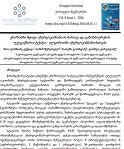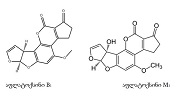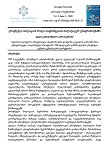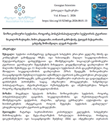Problematic issues related to the phenotypic characteristics, persistence and progression of chronic endometritis
Downloads
Chronic endometritis is defined as mild persistent inflammation of the endometrium, characterised histologically by inflammatory cells in the endometrial stroma, including plasma cells, lymphocytes, eosinophils, and even lymphoid follicles. Diagnosing chronic endometritis is difficult for a variety of reasons. Most patients are asymptomatic, and ultrasound features are nonspecific. Microbiological examination is often not informative because most pathogens are non-cultivable. Chronic endometritis can be diagnosed by hysteroscopy based on detecting specific endometrial changes, such as focal or diffuse hyperemia, stromal edema, and micropolyps. Histopathological identification of plasma cells in endometrial biopsy specimens is considered the gold standard for the diagnosis of chronic endometritis. There is a hypothesis that chronic endometritis may be related to endometriosis, although studies in this direction are very scarce. There are different opinions about the persistence and progression of chronic endometritis, which require further research.
Downloads
Farghali MM, Abdelazim I, El-Ghazaly TE. Relation between chronic endometritis and recurrent miscarriage. Menopausal Review. 2021;20(3):116–21.
Song D, Feng X, Zhang Q, Xia E, Xiao Y, Xie W, et al. Prevalence and confounders of chronic endometritis in premenopausal women with abnormal bleeding or reproductive failure. Reprod Biomed Online [Internet]. 2018 Jan 1 [cited 2024 Jul 24];36(1):78–83. Available from: https://pubmed.ncbi.nlm.nih.gov/29111313/
García-Velasco JA, Budding D, Campe H, Malfertheiner SF, Hamamah S, Santjohanser C, et al. The reproductive microbiome - clinical practice recommendations for fertility specialists. Reprod Biomed Online [Internet]. 2020 Sep 1 [cited 2024 Jul 24];41(3):443–53. Available from: https://pubmed.ncbi.nlm.nih.gov/32753361/
Kaku S, Kubo T, Kimura F, Nakamura A, Kitazawa J, Morimune A, et al. Relationship of chronic endometritis with chronic deciduitis in cases of miscarriage. BMC Womens Health [Internet]. 2020 Jun 1 [cited 2024 Jul 24];20(1). Available from: https://pubmed.ncbi.nlm.nih.gov/32487112/
Xu Y, Mei J, Diao L, Li Y, Ding L. Chronic endometritis and reproductive failure: Role of syndecan-1. Am J Reprod Immunol [Internet]. 2020 Sep 1 [cited 2024 Jul 24];84(3). Available from: https://pubmed.ncbi.nlm.nih.gov/32329146/
Kimura F, Takebayashi A, Ishida M, Nakamura A, Kitazawa J, Morimune A, et al. Review: Chronic endometritis and its effect on reproduction. J Obstet Gynaecol Res [Internet]. 2019 May 1 [cited 2024 Jul 24];45(5):951–60. Available from: https://pubmed.ncbi.nlm.nih.gov/30843321/
Santoro A, Travaglino A, Inzani F, Angelico G, Raffone A, Maruotti GM, et al. The Role of Plasma Cells as a Marker of Chronic Endometritis: A Systematic Review and Meta-Analysis. Biomedicines. 2023 Jun 15;11(6):1714.
Chen Y qing, Fang R li, Luo Y na, Luo C qiao. Analysis of the diagnostic value of CD138 for chronic endometritis, the risk factors for the pathogenesis of chronic endometritis and the effect of chronic endometritis on pregnancy: a cohort study. BMC Womens Health. 2016 Dec 5;16(1):60.
Buzzaccarini G, Vitagliano A, Andrisani A, Santarsiero CM, Cicinelli R, Nardelli C, et al. Chronic endometritis and altered embryo implantation: a unified pathophysiological theory from a literature systematic review. J Assist Reprod Genet. 2020 Dec 6;37(12):2897–911.
Moreno I, Cicinelli E, Garcia-Grau I, Gonzalez-Monfort M, Bau D, Vilella F, et al. The diagnosis of chronic endometritis in infertile asymptomatic women: a comparative study of histology, microbial cultures, hysteroscopy, and molecular microbiology. Am J Obstet Gynecol. 2018 Jun;218(6):602.e1-602.e16.
Liu Y, Ko EYL, Wong KKW, Chen X, Cheung WC, Law TSM, et al. Endometrial microbiota in infertile women with and without chronic endometritis as diagnosed using a quantitative and reference range-based method. Fertil Steril. 2019 Oct;112(4):707-717.e1.
Moreno I, Garcia-Grau I, Perez-Villaroya D, Gonzalez-Monfort M, Bahçeci M, Barrionuevo MJ, et al. Endometrial microbiota composition is associated with reproductive outcome in infertile patients. Microbiome [Internet]. 2022 Dec 1 [cited 2024 Jul 24];10(1). Available from: https://pubmed.ncbi.nlm.nih.gov/34980280/
Cicinelli E, Bettocchi S, de Ziegler D, Loizzi V, Cormio G, Marinaccio M, et al. Chronic Endometritis, a Common Disease Hidden Behind Endometrial Polyps in Premenopausal Women: First Evidence From a Case-Control Study. J Minim Invasive Gynecol [Internet]. 2019 Nov 1 [cited 2024 Jul 24];26(7):1346–50. Available from: https://pubmed.ncbi.nlm.nih.gov/30708117/
Shen M, O’donnell E, Leon G, Kisovar A, Melo P, Zondervan K, et al. The role of endometrial B cells in normal endometrium and benign female reproductive pathologies: a systematic review. Hum Reprod Open [Internet]. 2022 [cited 2024 Jul 24];2022(1). Available from: /pmc/articles/PMC8825379/
Buchta Rosean C, Feng TY, Azar FN, Rutkowski MR. Impact of the microbiome on cancer progression and response to anti-cancer therapies. In 2019. p. 255–94.
Walther-António MRS, Chen J, Multinu F, Hokenstad A, Distad TJ, Cheek EH, et al. Potential contribution of the uterine microbiome in the development of endometrial cancer. Genome Med. 2016 Dec 25;8(1):122.
Cicinelli E, Vitagliano A, Kumar A, Lasmar RB, Bettocchi S, Haimovich S, et al. Unified diagnostic criteria for chronic endometritis at fluid hysteroscopy: proposal and reliability evaluation through an international randomized-controlled observer study. Fertil Steril. 2019 Jul;112(1):162-173.e2.
Li Y, Xu S, Yu S, Huang C, Lin S, Chen W, et al. Diagnosis of chronic endometritis: How many CD138 + cells/HPF in endometrial stroma affect pregnancy outcome of infertile women? American Journal of Reproductive Immunology. 2021 May 24;85(5).
Parks RN, Kim CJ, Al-Safi ZA, Armstrong AA, Zore T, Moatamed NA. Multiple Myeloma 1 Transcription Factor Is Superior to CD138 as a Marker of Plasma Cells in Endometrium. Int J Surg Pathol. 2019 Jun 28;27(4):372–9.
Mishra K, Wadhwa N, Guleria K, Agarwal S. ER, PR and Ki‐67 expression status in granulomatous and chronic non‐specific endometritis. Journal of Obstetrics and Gynaecology Research. 2008 Jun 23;34(3):371–8.
Copyright (c) 2024 Georgian Scientists

This work is licensed under a Creative Commons Attribution-NonCommercial-NoDerivatives 4.0 International License.


























































































































































































































